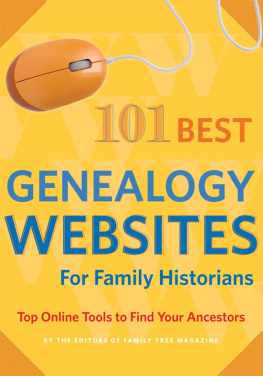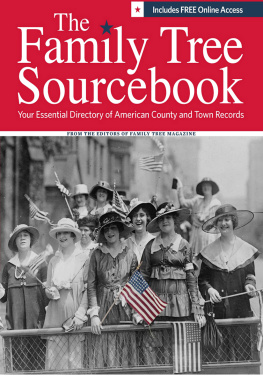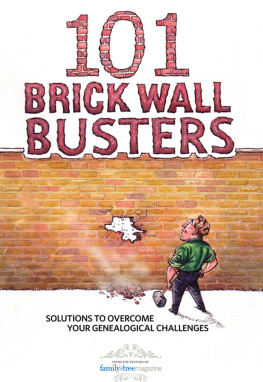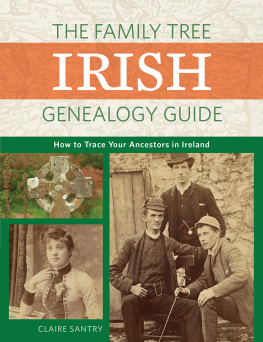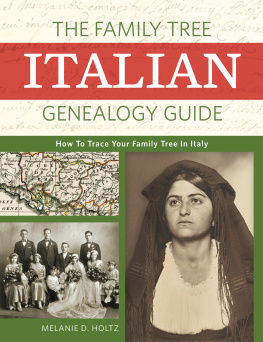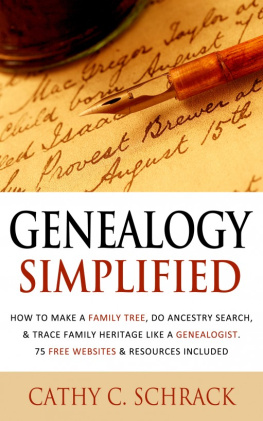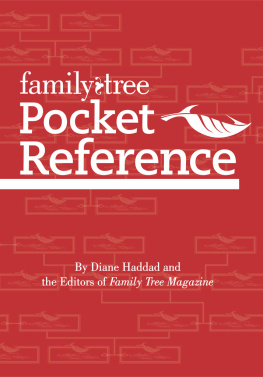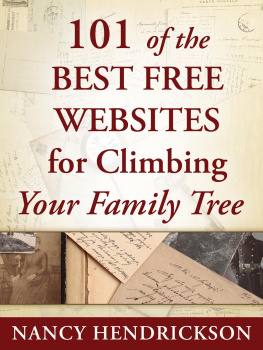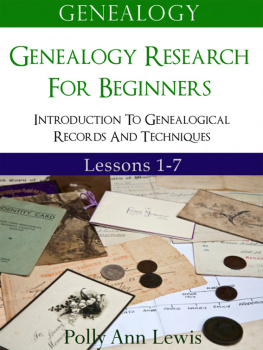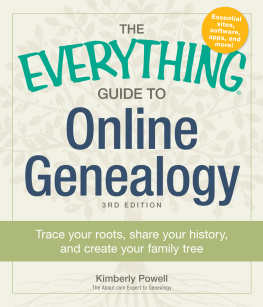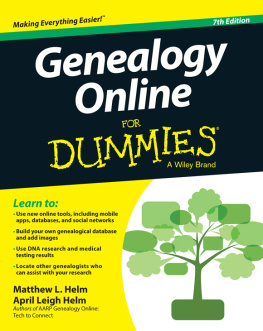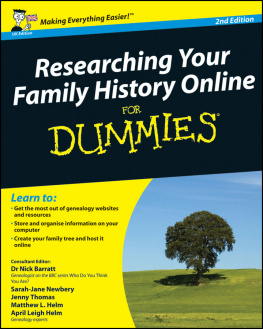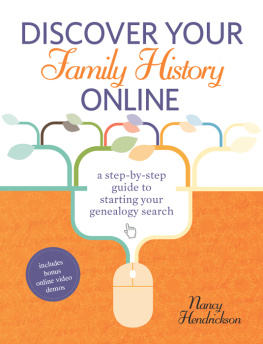101 Best Genealogy Websites for Family History Research
Top Online Tools to Find Your Ancestors
by The Editors of Family Tree Magazine
Cincinnati, Ohio
shopfamilytree.com
As you know from the way an afternoon slips away when youre doing genealogy research, time really does fly when youre having fun. So too it is with Family Tree Magazines annual 101 Best Websites compilation: Its hard to believe this is the thirteenth such list the magazine has compiled. Fortunately, were not triskaidekaphobicwe embrace this compilation as a lucky thirteenth. In fact, to celebrate, weve come up with 13 categories for this years list.
Our lucky thirteen lineup includes both free and paid websites. Wweve indicated with a $ symbol those that require payment to access the core content or the features weve highlighted in our description of the site. In most cases, websites that are free except for paid premium services dont carry the $ sign. We think this listing of stellar sites will prove lucky for your genealogy research.
Heritage Heavyweights
Ancestry.com
The 1940 US census is only one recent addition to this subscription site ($155.40 per year for a US Discovery membership, $299.40 per year for a World Explorer membership), which truly has something for everyone. Also new are the indexed 1911 UK census, more US vital records, additional church records and more occupation-related records. You can host your family tree for free here, too, and use the free iPad, iPhone and new Android apps to view it and research on the go. Ancestry.com has also essentially absorbed the venerable, free Roots-Web site , home to World-Connect pedigree files, volunteer-transcribed records, mailing lists, message boards and getting-started tips.
The Big One
Though other websites are chipping away at its lead, Ancestry.com still has the biggest subscription genealogy collection on the web with 10 billion indexed records. If you dont have a subscription, you can search most of those records at a library offering Ancestry Library Edition.
These Ancestry.com search tips are from our video class Your Unofficial Guide to Ancestry.com: Tips, Hints and Hacks for Finding Your Ancestors. A recording is available for purchase at .
- Skip the basic search form. Use the advanced search form and expand it to see all search fields.
- Want a specific type of record? Use the form for that records collection to take advantage of more-customized search options. The immigration collection form, for example, lets you enter an arrival date and place of origin.
- Think twice before you check the Exact Match box: This eliminates name variations and other close results that could be your family.
- If you dont like the matches you get with the default search filters, customize the filters. For example, the default filters for given names find records that match exactly the name you typed, sound like it, are variants or have a similar meaning or spelling, or have the same initial. You could instead choose to find records with matching or sounds-like given names, but not variants or initials.
- Take advantage of wildcards for catching variant name spellings: ? replaces a single character and * replaces any number of characters. You can use more than one wildcard, but you must use at least three actual characters in a name youre searching for. You can start or end the name with a wildcard, but not both.
- Fill in the search form fields for family members, especially if one has an unusual name.
- If you dont check Exact for dates, Ancestry.com assumes an automatic fudge factor of plus or minus five years for births and two years for deaths. If you check Exact for dates, specify a date rangeour ancestors were often inconsistent when giving their ages and birth dates.
- Dont use Exact for a death date unless youre looking for a death record. Most records were created during your ancestors lifetime and wont have anything in the death date field.
- Not sure where your ancestor lived? Location filters let you restrict your search to an exact place, to that place and neighboring counties and/or states (handy for eras when borders were shifting), or to the entire country.
- For hard-to-find folks, try searching without a last name and entering other criteria instead.
Archives.com
This booming subscription site numbering more than 2 billion records is poised to become part of the Ancestry.com family, if federal regulators approve the acquisition announced in April. Both companies CEOs say Archives.com will remain a distinct site and continue to be a key partner in the volunteer effort to index the 1940 US census.
Besides the rest of the US census images (a collection still in the works), resources include US vital records, newspapers and obituaries, and UK census and vital-records images. You can also build your family tree here, and its integrated with Facebook. All this for a bargain rate of $39.95 a year.
FamilySearch
Completely overhauled and expanded, this early innovator in online genealogy is once again at the front of the pack. A wealth of digitized records, family history books, new ways to search the Family History Library catalog, a Research Wiki and improved records searching make this free siteand its more than 2.5 billion recordsyour first stop in almost any genealogy undertaking.
Tip
Only a small percentage of all historical records are available through websites such as thesebut online library catalogs and finding aids can help you locate and access those offline records, too.
fold3
The site formerly known as Footnote.com now focuses on military records, which include Revolutionary War papers and pension applications, and Civil War service records (especially from the Confederacy). But its more than 90 million records, all searchable with images, also include newspapers, city directories, naturalizations, the 1860 and 1930 US censuses, and more. An all-access annual subscription costs $79.95.
GenealogyBank
Although this subscription site ($69.95 a year if paid annually) also offers historical books and documents, the main attraction is its ever-growing historical newspaper collection, which added 22 million articles in March alone. You can search the database of more than 5,850 newspaperstotaling over 600 million articles by names and keyword all at once, by place or by individual titles.
HeritageQuest Online
Individuals cant subscribe to this institutional site, so youll need to convince your local library. Try telling them it offers images of US censuses through 1930, 28,000 family and local histories, the Periodical Source Index to 2.3 million genealogy articles, Revolutionary War pension and bounty applications, Freedmens Bank records and the US Serial Set.
Library of Congress
Wonder about your tax dollars at work? Search this online catalog of pretty much every book there is, along with the National Union Catalog of Manuscript Collections (you may have heard it called nuk-muk). Or picture the past with the American Memory digital collection of maps, photos, documents, audio and video on topics from landscape architecture to war. Then check out the Chronicling America newspaper collection , which has grown to more than 4.8 million digitized pages, plus a directory of historical US newspapers and archives where you can find copies today.

